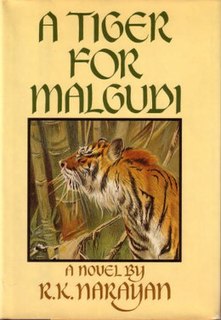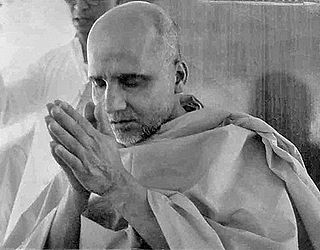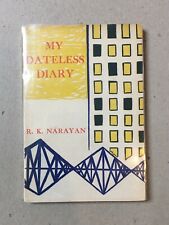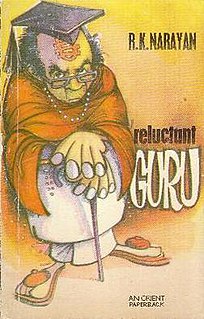
Kannada is a Dravidian language spoken predominantly by the people of Karnataka in the southwestern region of India. The language is also spoken by linguistic minorities in the states of Maharashtra, Andhra Pradesh, Tamil Nadu, Telangana, Kerala and Goa; and also by Kannadigas abroad. The language had roughly 43 million native speakers by 2011. Kannada is also spoken as a second and third language by over 12.9 million non-native speakers in Karnataka, which adds up to 56.9 million speakers. Kannada was the court language of some of the most powerful dynasties of south and central India, namely the Kadambas, Chalukyas, Rashtrakutas, Hoysalas and the Vijayanagara empire. It is one of the scheduled languages of India and the official and administrative language of the state of Karnataka.

Rasipuram Krishnaswami Iyer Narayanaswami was an Indian writer known for his work set in the fictional South Indian town of Malgudi. He was a leading author of early Indian literature in English along with Mulk Raj Anand and Raja Rao.

Jayaprakash Narayan, popularly referred to as JP or Lok Nayak, was an Indian independence activist, theorist, socialist and political leader. He is remembered for leading the mid-1970s opposition against Prime Minister Indira Gandhi, for whose overthrow he had called for a "total revolution". His biography, Jayaprakash, was written by his nationalist friend and the writer of Hindi literature, Rambriksh Benipuri. In 1999, he was posthumously awarded the Bharat Ratna, India's highest civilian award, in recognition of his social service. Other awards include the Magsaysay award for Public Service in 1965.

Rasipuram Krishnaswami Laxman was an Indian cartoonist, illustrator, and humorist. He is best known for his creation The Common Man and for his daily cartoon strip, You Said It in The Times of India, which started in 1951.

A Tiger for Malgudi is a 1983 novel by R. K. Narayan told by a tiger in the first person. Deeply moving is the attachment of the tiger to the monk and the monk's care for the tiger. R. K. Narayan consulted with noted tiger expert K. Ullas Karanth on the writing of this novel. Narayan used the myth of Buddha's enlightenment in this particular novel. The novel is set in the fictional town of Malgudi.

All India Kisan Sabha, is the peasant or farmers' wing of the Communist Party of India, an important peasant movement formed by Sahajanand Saraswati in 1936.

Malpe is a natural port in the Udupi District in Karnataka, India. Located at the mouth of the Malpe River about six kilometers to the west of Udupi, it is an important port and a major fishing harbor on the Karnataka coast. The town of Malpe is associated largely with settlements of the Mogaveera fisherman community. Malpe is a hub of Mogaveera, Billava and Muslim population.

Shovana Narayan is a recognised Indian Kathak dancer and a career officer with Indian Audit and Accounts Service. She performs in India and internationally, and has been awarded the Padma Shri. She is trained under Birju Maharaj.

Gaud Saraswat Brahmins are a Hindu ethno-religious community that is part of the larger Saraswat Brahmin community that migrated to Konkan from Gaud, as per the Skanda Purana in ancient India. They belong to the Pancha (five) Gauda Brahmana groups.They primarily speak Konkani and it's various dialects, as their mother tongue.

Swami Krishnananda Saraswati was a disciple of Sivananda Saraswati and served as the General Secretary of the Divine Life Society in Rishikesh, India from 1958 until 2001. Author of more than 40 texts, and lecturing extensively, on yoga, religion, and metaphysics, Krishnananda was a prolific theologian, saint, yogi and philosopher.

The Ramayana is a mythological book by R. K. Narayan. It was first published by Chatto and Windus, London in 1972. The book is a shortened, prose adaptation of the Tamil Kamba Ramayanam. In 1938, Narayan made a promise to his dying uncle that he would translate the Kamba Ramayana to English, however, he did not think about this promise until 1968 when he began work on this effort. He later wrote The Mahabharata, published in 1978.

My Dateless Diary is a collection of autobiographical essays by R. K. Narayan published in 1960. The book was the output of a daily journal that he maintained during his visit to the United States on a Rockefeller Fellowship in 1956. While on this visit, Narayan also completed The Guide, the writing of which is covered in this book. The book is focused on Narayan's interactions with the American people and the people themselves. The book also highlights Narayan's view of the west, his appreciation and admiration in general, but subtle disapproval of specific aspects while making it known that there isn't much of a gap between his values and those he has come across. The book offers insights into both, the author and his subjects.

Next Sunday is a collection of weekly essays by R. K. Narayan published in 1960. The book provides insights into Narayan's writings and perspectives and the protagonists of his works - the middle class common man. The book also includes his reflections on the themes of and actions in his novels and short stories.

A Writer's Nightmare is a collection of essays by R. K. Narayan published in 1988 by Penguin Books. The essays included in the book are about topics as diverse as the caste system, love, Nobel prize winners and monkeys; the book provides readers a unique view of Indian life. The essays were written at various points between 1958 and 1988; the book includes a significant essay, Misguided Guide, expressing Narayan's displeasure with the film Guide, based on his book The Guide.

Reluctant Guru is a book by R. K. Narayan published in 1974 by Orient Paperbacks. The book consists entirely of discursive essays, some of which were his weekly contributions to The Hindu. Some of the essays relate to the topic of his American stay, describing with his characteristic irony, the expectations of Americans that he would show them the key to the spiritual life of Indians. One criticism of the book is that the essays were too short and therefore lacking in depth.
National Translation Mission is a Government of India initiative to make knowledge texts accessible, in all Indian languages listed in the VIII schedule of the Constitution, through translation. NTM was set up on the recommendation of the National Knowledge Commission. The Ministry of Human Resource Development has designated Central Institute of Indian Languages as the nodal organization for the operationalization of NTM.

Ganesh Dāmodar Sāvarkar, also called Babarao Savarkar, was an Indian politician, activist, nationalist, and founder of the Abhinav Bharat Society.

The Koraga are a tribal community found mainly in the Dakshina Kannada, Udupi districts of Karnataka and the Kasaragod district of Kerala, south India. These areas in Karnataka, are altogether often referred to as Tulunaad, which roughly corresponds to the boundaries of the erstwhile South Canara district. They are also found in small numbers in adjoining districts of Uttara Kannada, Shimoga and Kodagu. The Koraga are classified by the Government of India as a Scheduled Tribe.
Tekkatte Narayan Shanbhag (1925-2009) was an Indian scholar, bookseller and the founder of Strand Book Stores. He was credited with working to transform bookselling into a personal experience, prompting the writer Kushwant Singh, on a BBC show, to call Strand the only personal book shop in India. He was honoured by the Government of India in 2003 with Padma Shri, the fourth highest Indian civilian award.

















